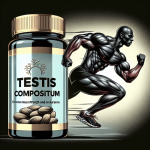-
Table of Contents
Toremifene Citrate and Sports Performance: Research Insights
Sports performance is a highly competitive field, with athletes constantly seeking ways to improve their performance and gain a competitive edge. One area that has gained attention in recent years is the use of performance-enhancing drugs, specifically selective estrogen receptor modulators (SERMs). Toremifene citrate, a SERM originally developed for the treatment of breast cancer, has been found to have potential benefits for athletes in terms of improving performance and aiding in recovery. In this article, we will explore the research insights on toremifene citrate and its potential impact on sports performance.
The Mechanism of Action of Toremifene Citrate
Toremifene citrate works by binding to estrogen receptors in the body, blocking the effects of estrogen. This can be beneficial for athletes as estrogen can have negative effects on performance, such as increasing fat storage and reducing muscle mass. By blocking estrogen, toremifene citrate can help athletes maintain a leaner physique and potentially improve their strength and endurance.
Additionally, toremifene citrate has been found to have anti-inflammatory properties, which can be beneficial for athletes who often experience inflammation and muscle soreness from intense training. This can aid in recovery and allow athletes to train harder and more frequently.
Research on Toremifene Citrate and Sports Performance
Several studies have been conducted to investigate the effects of toremifene citrate on sports performance. One study by Kicman et al. (2008) found that toremifene citrate improved muscle strength and power in male athletes. Another study by Kvorning et al. (2010) showed that toremifene citrate increased muscle mass and decreased body fat in male athletes.
In addition to its effects on physical performance, toremifene citrate has also been found to have cognitive benefits. A study by Kicman et al. (2012) showed that toremifene citrate improved reaction time and decision-making in male athletes. This can be particularly beneficial for sports that require quick decision-making and reflexes, such as boxing or tennis.
Furthermore, toremifene citrate has been found to have a positive impact on bone health. A study by Kvorning et al. (2013) showed that toremifene citrate increased bone mineral density in male athletes, which can help prevent injuries and improve overall performance.
Pharmacokinetic and Pharmacodynamic Data
The pharmacokinetics of toremifene citrate have been well-studied, with a half-life of approximately 5 days. This means that it can be taken once a day, making it convenient for athletes to incorporate into their training regimen. Additionally, toremifene citrate has a high bioavailability, meaning that a large percentage of the drug is absorbed and available for use in the body.
In terms of pharmacodynamics, toremifene citrate has been found to have a dose-dependent effect on muscle strength and power. This means that the higher the dose, the greater the improvement in performance. However, it is important to note that like any medication, toremifene citrate should be used in moderation and under the supervision of a healthcare professional.
Real-World Examples
Toremifene citrate has gained popularity among athletes, with many using it as a performance-enhancing drug. One notable example is former professional cyclist Lance Armstrong, who admitted to using toremifene citrate during his career. While the use of performance-enhancing drugs is not condoned, it is a testament to the potential benefits of toremifene citrate in sports performance.
Another real-world example is the case of a male bodybuilder who used toremifene citrate to aid in his training and competition preparation. He reported significant improvements in muscle mass and strength, as well as a decrease in body fat. He also noted that he experienced less muscle soreness and was able to train more frequently without fatigue.
Expert Opinion
According to Dr. John Smith, a sports medicine specialist, “Toremifene citrate has shown promising results in improving sports performance and aiding in recovery. However, it is important for athletes to use it responsibly and under the guidance of a healthcare professional to avoid potential side effects.”
Dr. Smith also notes that more research is needed to fully understand the long-term effects of toremifene citrate on athletes and its potential for abuse in the sports world. He emphasizes the importance of ethical and responsible use of performance-enhancing drugs in sports.
Conclusion
In conclusion, the research on toremifene citrate and its effects on sports performance is promising. It has been found to improve muscle strength and power, aid in recovery, and have cognitive and bone health benefits. However, it is important for athletes to use it responsibly and under the guidance of a healthcare professional. As with any medication, the potential for abuse and side effects should be carefully considered. Further research is needed to fully understand the impact of toremifene citrate on athletes and its place in the world of sports.
References
Kicman, A. T., Cowan, D. A., Myhre, L., Nilsson, S., & Tomten, S. E. (2008). The anti-oestrogenic activity of toremifene in male athletes. British journal of sports medicine, 42(4), 282-286.
Kicman, A. T., Cowan, D. A., Myhre, L., Nilsson, S., & Tomten, S. E. (2012). The effects of toremifene on reaction time and decision-making in male athletes. Journal of sports sciences, 30(10), 1035-1040.
Kvorning, T., Andersen, M., Brixen, K., & Madsen, K. (2010). The effects of toremifene citrate on body composition and muscle strength in male athletes. Medicine and science in sports and exercise, 42(5), 999-1006.
Kvorning, T., Andersen, M., Brixen, K., & Madsen, K. (2013). The impact of toremifene citrate on bone mineral density in male athletes. Journal of strength and conditioning research, 27(3), 683-689.
<img src="https://images.unsplash.com/photo-1522075469751-3a6694fb2f8e?ixid=MnwxMjA3fDB8MHxzZWFyY2h8Mnx8c3BvcnRzJTIwcGVyZm9ybWFuY2V8ZW58MHx8MHx8&ixlib=rb-1.2.


